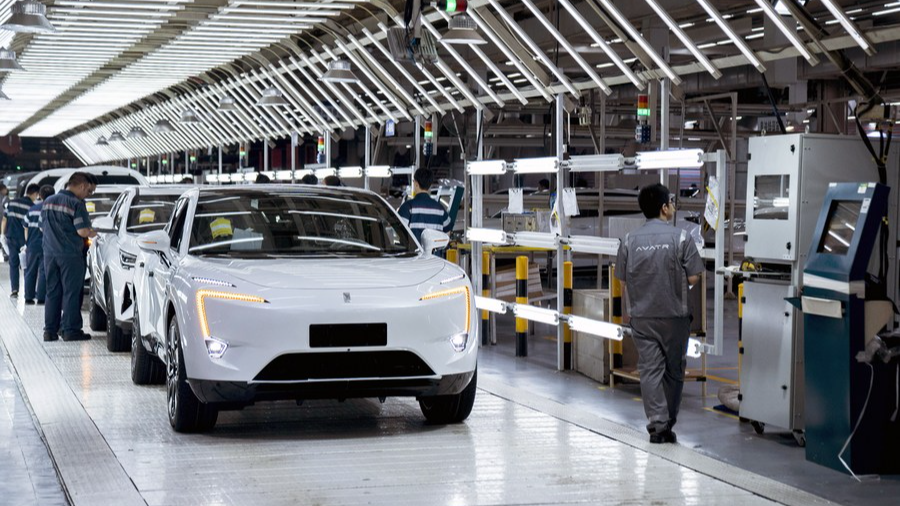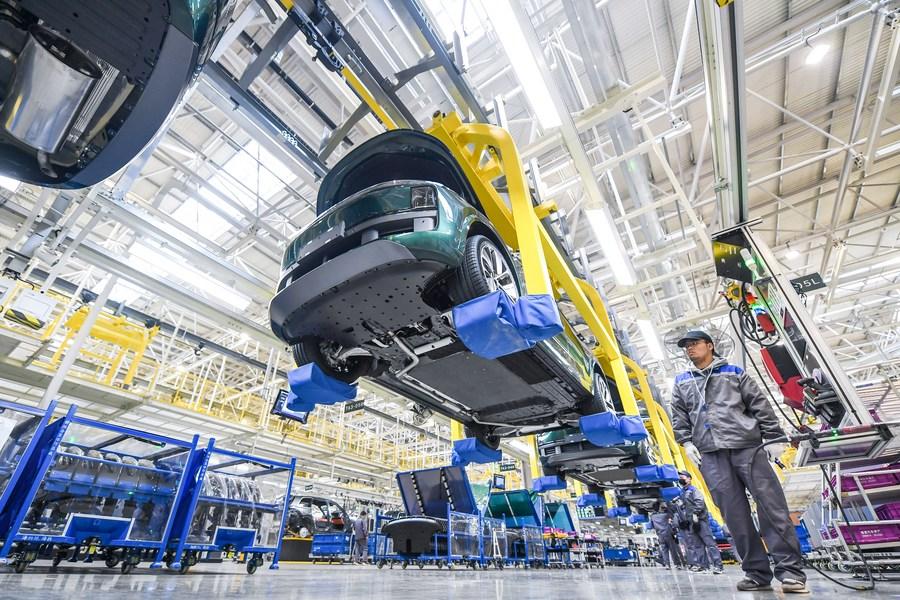
Workers are busy at a production line of the new energy vehicle AVATR at a workshop of Chang'an Auto in Jiangbei District, southwest China's Chongqing Municipality, July 20, 2023. [Photo/Xinhua]
By Alexander Ayertey Odonkor
The European Commission on June 12 announced additional tariffs of up to 38.1 percent on China-made electric vehicles (EVs) for what it claims to be an action to safeguard industries and jobs inside the European bloc. Expected to take effect by July, three leading Chinese EV manufacturers BYD, Geely and SAIC face tariffs of 17.4 percent, 20 percent and 38.1 percent, respectively – the Commission says other companies that cooperate with the investigation would face a tariff of 21 percent while 38.1 percent import duties will be apportioned to non-cooperating companies.
With the EU currently charging a 10 percent levy on all car imports, the new tariffs, a blot on the already tense China-EU trade relationship further threatens economic activity, especially for the bloc considered to be one of the most outward-oriented economies and the world's single-largest market area.
Considering China's status as the world's largest automobile market, the EU's latest move not only exacerbates the plight of the bloc's EV sector which is grappling with declining domestic demand but also impedes China-EU trade. A recent study by the Kiel Institute for the World Economy shows a 20 percent tariff on Chinese EVs could lead to a whopping $3.8 billion drop in the bloc's EV imports, representing almost 25 percent of the current value of its trade.
With trade and investment serving as the cornerstone of China-EU relations, cooperation in this area has widened and deepened since China joined the World Trade Organization (WTO) in 2001 – providing enormous benefits. In fact, bilateral trade has supported growth in various industries and fostered job creation across China, Europe and beyond.
Recent data shows China and the EU, which account for over a third of global GDP, are two of the biggest trading partners in the world. With China-EU exports accounting for more than a third of world trade, the two economic powerhouses trade goods over $800 billion annually with each other.
While telecom equipment is China's leading export to the EU, the bloc's number one exports to China are cars. For EU enterprises, particularly those in the automobile sector, access to China, the world's most competitive and largest EV market, is increasingly important – not only because the market is lucrative but also healthy competition fosters innovation and improves product quality.
However, the EU's latest move, which follows in the footsteps of the recent hefty tariff hikes imposed on Chinese EVs by the U.S., threatens the interest of EU enterprises. While the EU justifies these protectionist measures as an attempt to safeguard industries and jobs inside the bloc, it's likely the move may yield the desired outcome especially in the short term, but, in the long run, the tariff hikes will ultimately erode EU enterprises' competitiveness in the EV sector on the global market.

A workshop of Chinese electric vehicle (EV) maker Li Auto Inc. in Changzhou, east China's Jiangsu Province, February 15, 2023. [Photo/Xinhua]
Home to by far the world's top filer of patent applications – including patents relating to EV charging and battery swapping, China's rapid growth in recent years coupled with its strong supply chain has not only fostered innovation and high-end manufacturing in the country's EV sector but also increasingly attracts foreign enterprises including European companies – and some have established industry collaborations in China.
By establishing and strengthening cooperation with domestic players in the Chinese EV sector, European companies are able to spur innovation, continuously improve product quality at reduced cost and meet constantly changing consumer demands at home and abroad – highlighting the benefits of free trade.
In a recent example, leaders of Spotlight Automotive, German auto giant BMW's 50-50 EV venture with Great Wall Motor – China's largest sport-utility vehicle maker, announced in April this year that the venture is designing and building new models it hopes to sell to customers worldwide including Europe and Southeast Asia. However, the company has indicated it will not operate in markets that impose hefty tariffs on made-in-China cars. Jason Zhang, director of governance and public relations at Spotlight said"except for markets that levy unreasonably high tariffs (on Chinese-made EVs), Spotlight is designing and building cars for customers all over the world."
Apparently, just like in the case of Spotlight, several other industry collaborations between Chinese EV enterprises and their European counterparts could face daunting challenges as a result of the EU's latest move to impose tariffs on Chinese-made EVs.
In Europe, the tariffs hike on Chinese-made EVs presents another blow to the bloc's struggling EV sector. According to Ernst & Young (EY) Mobility Lens Forecaster published in June this year, Europe's EV sales are slowing as a result of reductions in EV incentives, lack of affordable EV models and consumer concerns about insufficient chargers. Conversely, China remains on course for growth with EVs expected to account for more than 50 percent of all sales by 2030 – two years faster than previously suggested by forecasts.
Clearly, both parties could have benefited enormously if the EU had opted for win-win cooperation rather than impose new tariffs on Chinese-made EVs.
Alexander Ayertey Odonkor, a special commentator on current affairs for CGTN, is a global economist with a keen interest in the social, environmental and economic landscape of both developing and developed countries, particularly in Asia, Africa and Europe.

 中文
中文



